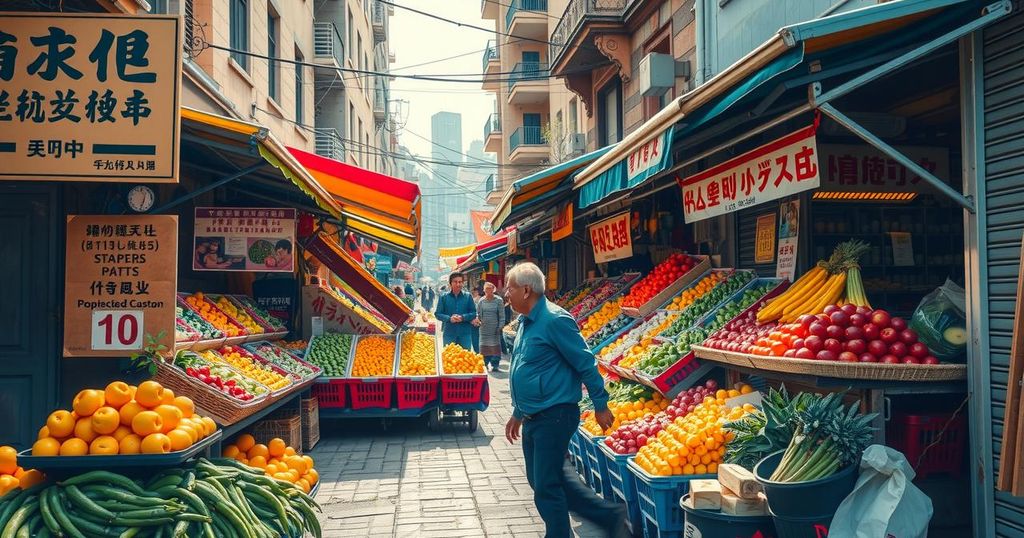Why Are Zimbabwe Police Chasing Off Some of the Economy’s Biggest Players?

Harare’s municipal police have intensified crackdowns on informal vendors, disrupting their livelihoods through aggressive raids. The local government claims such measures are necessary for public order, but critics argue they waste resources on enforcement instead of supporting this crucial sector of the economy. As vendor arrests and bribes continue, voices from the community call for a reevaluation of policies affecting their survival and contributions to the local economy.
In Harare, the municipal police’s aggressive actions against informal vendors have become a frequent spectacle. The vendors, often unaware of their impending doom, find themselves scrambling to protect their goods during sudden raids, which have resulted in property destruction and arrests. “They have no mercy at all. Once they take your stock, you’ll never get it back,” lamented Saul Nhema, a vegetable vendor who turned to this line of work after losing his construction job. Such skirmishes occurred even as Global Press Journal reporters interviewed him, underscoring the precarious nature of vendor life in the city.
This is not a new story. Harare City Council has been actively targeting informal vendors, claiming these initiatives are necessary for city order, primarily citing illegal street vending, health issues, and littering as their motives. However, the increasing severity of crackdowns raises eyebrows, especially given the local government’s failure to provide essential public services such as clean drinking water.
To put things in perspective, the council reported a revenue of merely US$3 million in 2024, while the costs associated with policing operations against vendors topped over US$24 million—an astonishing figure that is eight times the council’s income. In 2025, the expenses escalated even further as the council formed a dedicated police unit to target vendors.
Notably, the financial strain on the council is worsening, with projections estimating revenue to drop to US$2 million. Increasing police presence represents a significant financial burden for the already cash-strapped local government, which is now leaning more heavily on the central government to absorb these costs. Vendors, such as Zvikomborero Guvheya, emphasize the crucial role they play in Zimbabwe’s economy despite the near-constant threat of police raids and harassment.
Efforts to fund a specialized police unit appear misguided to some. Reuben Akili, director of the Combined Harare Residents Association, suggested that funds allocated toward enforcement might be better used for supporting the informal sector, like improving public facilities. “If we examine the funds allocated for enforcement covering salaries, fuel and operational costs, those resources could have been redirected toward rehabilitating markets or public restrooms in the city,” he noted.
Encompassing over 80% of Zimbabwe’s population, the informal sector significantly contributes to the economic landscape, accounting for nearly 72% of the nation’s GDP. Many African countries report similar trends, with informal vendors critical to urban economies. But these vendors face a complex reality, often operating in unregulated conditions, exposing them to the hazard of eviction in a bid to maintain urban order.
Samuel Wadzai, who leads the Vendors Initiative for Social and Economic Transformation, argues for a more nuanced approach to vendor management. He pointed out that raids have not yielded any real change, a stance also supported by the experiences of vendors, who often resort to bribing police to dodge evictions. Jesman Guvheya, a vendor and mother of five, explained the cycle of bribery necessary to continue her business. “But there can be three or four groups that move at different times per day and you may end up paying $4 to avoid being raided,” she detailed, despite knowing this was no foolproof strategy.
The cycle of risk is relentless. After evading police on a given day, Guvheya’s son faced arrest, forcing her to pay a bribe for his release. According to her, even after such payments, there is never a guarantee that goods will be safe. Vendors like Guvheya reflect a broader narrative of struggle, resilience, and necessity in Harare’s challenging economic landscape.
The ongoing struggle between Harare’s municipal police and informal vendors highlights significant flaws in the city’s handling of its economic landscape. With the informal economy being a lifeblood for so many, the city’s aggressive enforcement tactics seem ill-fitted to the realities vendors face. Critics argue for a more balanced approach, focusing on providing support rather than suppression. This is a complex issue, imbued with socio-economic ramifications that resonate throughout Zimbabwe.
Original Source: www.thezimbabwean.co








